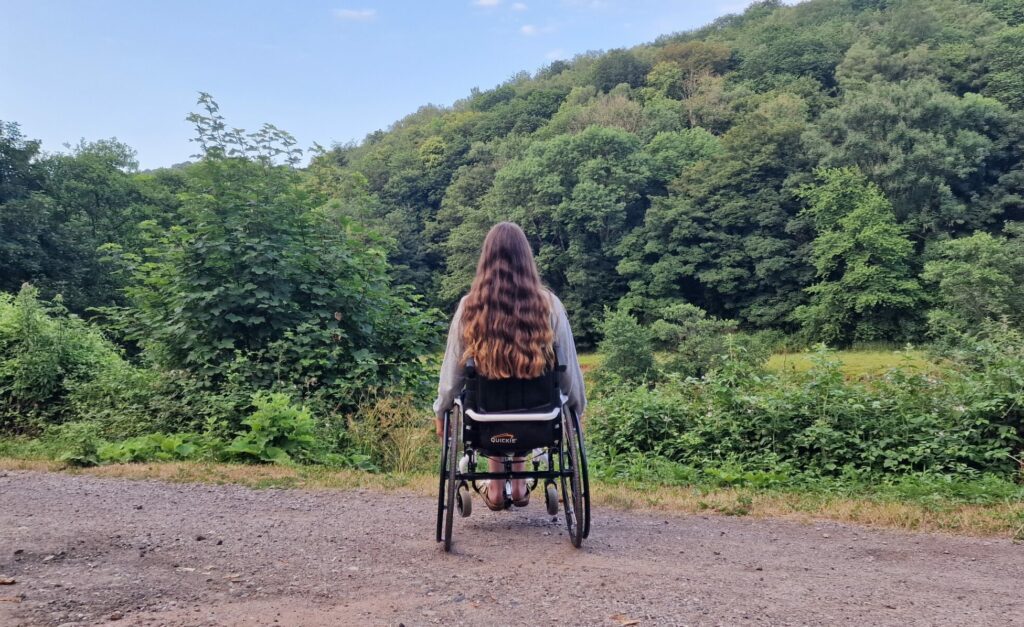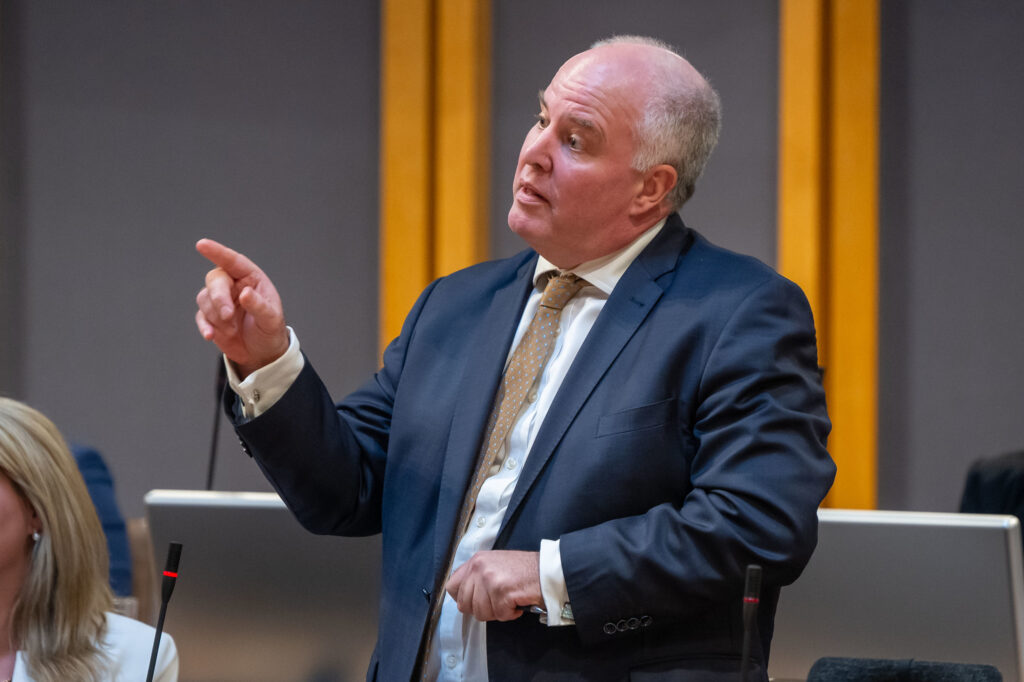Bethany Handley discusses how stories of ‘conquering’ the extremes of our landscapes remain at the heart of Welsh national identity. She calls for more inclusive stories that celebrate our dependence on the natural world and the diversity of our experiences in the outdoors.
When I became a wheelchair user, the most challenging part of reclaiming my identity was not being unable to walk or run, the daily pain, or strangers asking what happened, nor was it being unable to walk through woods or climb mountains; it was being written out of our stories.
I grew up hiking, caving and climbing in the Brecon Beacons and the landscape was the bedrock of my sense of self. When you can’t access a space, you are excluded from that space, but also its language, stories and national identity. When your community can’t access a space, you see the symbolic annihilation of your body and identity.
Is my love of the outdoors less valid because my legs refuse to carry me through the extremes of our landscape?
Nature writing and discussions examining our relationships with nature often focus on extreme interactions with the outdoors. I recently attended a talk on women and nature, expecting reflections on our landscapes and biodiversity. Instead, one of the panellists recounted her love of trail running, running an impressive forty miles along ridges. Outdoor pursuits have never been more fashionable with many people who have been historically excluded from these pursuits (thankfully) reclaiming extreme sports from a previously male dominated space. The panellist shared how running helped her regain love for and control over her body and how anyone could run the same distances, they just had to start training. The panel agreed that the modern, independent woman moved freely through the outdoors. These narratives are empowering for many and are challenging and reshaping ideas of womanhood. However, for those of us who are not permitted access to outdoor pursuits, these narratives are wounding.
I left the event in tears, othered by their narratives and frustrated with my own body. Do my legs betray my womanhood because they no longer support my independence? Do I have less of a right to go kayaking, for example, because I’m lifted into the boat? Is my love of the outdoors less valid because my legs refuse to carry me through the extremes of our landscape?
Recovery started when I realised that personal independence is a myth. Independence is not empowerment; celebrating our dependence is. In my teens I went solo trekking in Canada and I was no more independent than I am now. A hiker is dependent on a map, weather conditions, terrain, their boots and supplies. Similarly, my freedom in the outdoors is enabled by my wheelchair, level paths and sometimes help from another. We are all dependent on our resources and the natural world around us. When we are blinkered by the myth of independence, we fail to appreciate the complexities of the natural world around us and our influence upon it. The fallacy that dependence is weakness must be dismantled for the health of everyone, Disabled and non-disabled. Dismantling the myth of independence is crucial to the health of our planet.
I’m grateful that my body has forced me to slow down and become more observant. From my hospital bed I savoured the view of a flat roof: the beauty of the water evaporating from the concrete kept me tethered to the outside world. By focusing on presence and awe, even on that stark hospital roof, I stopped pressuring myself to ‘overcome’ my impairment to hike or climb again and I felt more in tune with the processes of the world around me and more patient with my body.
Innovative. Informed. Independent.
Your support can help us make Wales better.
Whilst doing yoga in the grass I can’t feel the ants crawling across my legs, but I’ve started to see them. Despite the rapidly declining biodiversity in the insect world, I’ve seen a far greater variety of insects this year than ever before. Whilst wheeling along paths, I now notice every pebble, ever acorn, every tree root, every blade of grass hitchhiking in my spokes. At the beach, I cannot feel the sand between my toes but I notice how compact the sand is, if it’s still damp from the tide and the exact gradient and colours of the beach. I notice the diversity of grasses in lawns and have spent hours studying the sparrows that return to nest by the house.
When we move through the outdoors at a slower pace, we can savour the complexity and power of the world around us. So why do we romanticise extreme experiences of the outdoors?
Narratives of ‘conquering’ the extremes of our landscape lie at the heart of historical masculine notions of Welsh identity. My English housemate declared over spaghetti that to have the full ‘Welsh’ experience he’d have to climb Pen y Fan. Historically, Welshness is white non-disabled men standing on the summits of Pen Y Fan, Yr Wyddfa and Cadair Idris, the figure of giants claiming the sky and the land below their feet. Our landscape forms a fortress, encasing Welsh identity in protected imagery and pace. Our national identity has been bound up in ‘conquering’ the extremes of our landscapes; so too have our stories.
The natural world does not choose to exclude many Disabled people. We exclude Disabled people by design.
These stories of ‘conquering’ our landscapes justify and reinforce the barriers to our spaces and identities. An Ordnance Survey map, for example, plots the stories of people who walk steadily through a space. From winding footpaths forged by the feet of communities over centuries, to new flat tarmacked cycle tracks, an OS map welcomes people who move free from barriers to join the path. For those of us who wheel or move differently through the world, maps meet us with nothing but silence. The new flat tarmacked cycle tracks may be perfect for wheelchair users, for example, but OS maps give us no indication of whether we can access the space. Maps don’t invite us to a space or show us where our communities moved before. Maps erase us.
The natural world does not choose to exclude many Disabled people. We exclude Disabled people by design. Yes, I can’t wheel up mountains but there are outdoor spaces I can access and move freely within; yet, my body is designed out of them. We write maps but only for drivers, people who walk with ease, and cyclists. We do not fund offroad wheels or wheelchairs. We offer swan pedalos but rarely offer beach wheelchairs. Flat paths that would be perfect for wheelchair users are often gated and locked, only permitting access to walkers. We ask whether benches ruin views. We close off fields with kissing gates. We often mark accessible spaces at shops and in cities but rarely mark accessible parking spaces at beauty spots. We fund new coast paths but don’t consider how wheels would navigate the surface. We place deep storm drains across flat footpaths rather than beside them. We tell stories of how people walk quickly through a chosen space.
For walking month in May, Sport RCT (part of Rhondda Cynon Taff County Borough Council) shared 50 routes across Rhondda Cynon Taff. Sport RCT exists to get ‘more people more active more often in Rhonnda Cynon Taff.’ The 50 routes were marked as walking trails, cycling trails or trails suitable for both. They also included links to the waypoints of the walks, the distances and total assents, but not a single route included any information on accessibility. Some of the trails were close to my house yet, as a wheelchair user, I had absolutely no idea from looking at the routes mapped out whether I could access them, even with my offroad attachment. Not considering how Disabled people may move through a space, either unconsciously or consciously, is an active effort to exclude Disabled people from those spaces.
Innovative. Informed. Independent.
Your support can help us make Wales better.
A body is a presence in space. When your body has been designed out of a landscape and the space that landscapes demand in your national identity you’re also denied a presence in our stories. When I enjoy accessible paths, I’m often stopped by strangers who ask what happened or make jokes about how wheelchairs should have speed limits. I can rarely enjoy outdoor spaces without strangers intruding upon my joy with staring or comments. I miss simple walker to walker nods or greetings. Walkers are often surprised, delighted or unsettled to see my wheelchair-using body sharing their space. Their reactions are proof that we lack diversity in our accounts of how humans move through the outdoors.
Where are the stories about our realities? The majority of the Welsh population live in towns or cities. Many of us enjoy nature through our house plants, urban parks, school fields or gardens. Our experiences of nature in homes, towns or cities are no less worthy than the experiences of wild campers and surfers. Visit Bute Park on a sunny day to see how it’s at the heart of Cardiff and many of its inhabitants’ identities.
We need to dismantle colonial narratives saturated with the macho bravado of ‘conquering’ Welsh mountains and share more stories about diverse experiences of moving through Welsh landscapes. Being written out of our stories as a Disabled woman has taught me to appreciate the micro details in the world around me, to celebrate my dependence on the environment and to challenge the ableism at the heart of nature narratives.
Caring for houseplants, wheeling along forest tracks, the energy of inner-city parks and hiking up mountains deserve to take up equal space in our stories and our identities. The more diverse stories that are told, the more we begin to look at who’s missing from our outdoor spaces, historically and now, and consciously design access to the outdoors for marginalised communities. When we share inclusive stories that highlight our dependence on the people, resources, and environments around us, we become more present and challenge the myth of independence, instead respecting and nurturing our natural environments and our roles as stewards within them. Rewriting diverse and inclusive stories celebrating Welsh nature is essential to the preservation of our planet.
All articles published on the welsh agenda are subject to IWA’s disclaimer. If you want to support our work tackling Wales’ key challenges, consider becoming a member.





